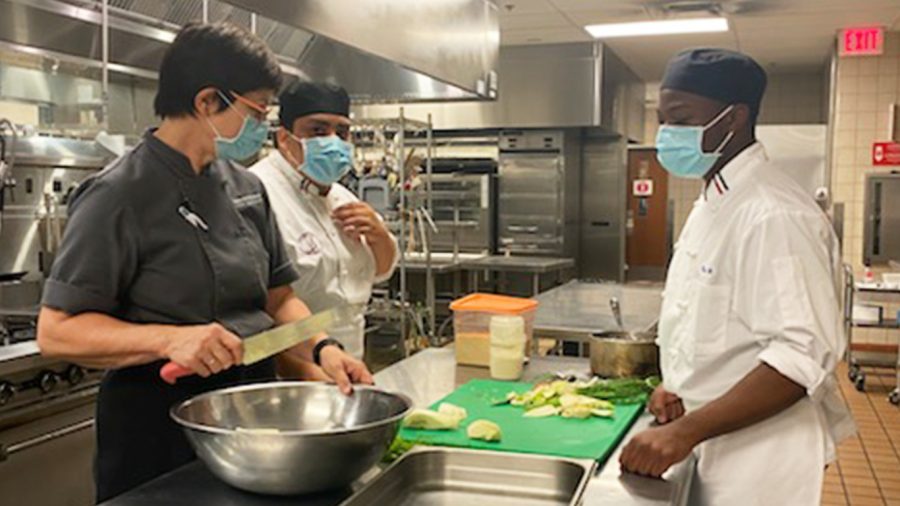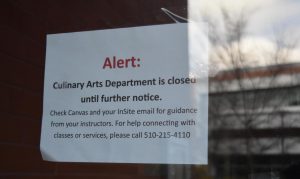Culinary arts program adjusts to COVID-19 regulations, distance learning
Program also experiences 30 percent drop in enrollment
Culinary arts professor Elisabeth Schwarz teaches students cutting techniques during a face-to-face class in the Aqua Terra Grill kitchen on Sept. 26.
Oct 20, 2020
The culinary arts program at Contra Costa College suffered a 30 percent loss of students due to the lack of resources students faced during the COVID-19 pandemic.
Across the country, COVID-19 has greatly affected both students and professors of culinary arts; CCC is no exception.
“COVID-19 turned the cooking world upside down,” Culinary Arts Department Chairperson Nader Sharkes said.
Sharkes had to cancel his baking class and only has 22 students for his regular daytime class.
Like many professors, Sharkes and culinary arts professor Elisabeth Schwarz had originally struggled with the transition of face-to-face instruction to remote instruction. Distance learning had never been done in the department.
“We had to adjust by using platforms like Zoom, Facebook Live, and Canvas,” Sharkes said. “The bad thing about this is that it has limited our relationships with the students.”
Sharkes explained how in the culinary arts department, both the instructor and student depend on the smell, taste and appearance of food to teach and learn.
One upside to smaller classes: there is more space in the kitchen, making it easier to implement the necessary social distance regulations for the COVID-19 pandemic.
Sharkes said there are labels all around the kitchen reminding people to stay six feet apart and wear masks.
There is also regular checking of everyone’s temperature, in addition to proper hand washing in the kitchen.
Even after such a loss, the culinary arts department has made efforts to provide students with a kit of kitchen utensils and access to Rouxbe, an online learning tool that specializes in culinary arts.
“We’ve been pretty successful in making it work,” Schwarz said.
Regional Director of the Community College Chancellor’s Office Audrey Le Baudour helped CCC’s culinary arts department obtain access to the Rouxbe program. The program helps students build culinary competence and confidence.
This online resource costs about $10,000 for all students, which Le Baudour was able to provide through the chancellor’s office.
According to Sharkes, the college did not provide anything monetarily.
Schwarz said face-to-face classes are now in session. However, with Rouxbe, they have been able to shorten the in-person classes, creating a hybrid type of class.
“Students can still enjoy themselves,” Schwarz said.
Even with Rouxbe, Sharkes said that for him, teaching online is overrated and has become a 24-hour job.
Due to the COVID-19 pandemic, all the usual culinary arts functioning events are cancelled, making business in the Aqua Terra restaurant the culinary program’s only source of income.
All other events are cancelled until the CDCs regulations change.
“Whenever someone walks in, we check their temperature and make sure to keep six feet apart,” Sharkes said.
Aside from regular hand washing, the floors are marked up at six feet intervals to avoid close contact.
Some students are happy to be back at CCC. Second-year culinary arts student Jorge Ramirez said that coming back to school is much better than the end of spring, when everything suddenly went online.
“I love (being back on campus) because it gets me out of the house and makes me feel productive,” Ramirez said.
Aqua Terra is open for lunch service in the Campus Center Plaza from 11:00 a.m. until 12:30 p.m. and takeout orders can be placed until noon.




